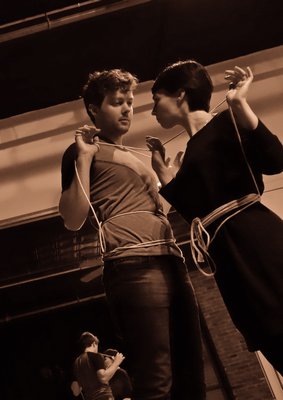
In 2011, Andrea Goldman was immersed in classical theater technique at the Bristol Old Vic Theatre School in England.
By the time the St. Louis native left one year later, she was on a dramatically alternate path—first in Berlin, to stage her play “Sometimes At Night,” before moving to Manhattan to hone her work in experimental theater.
She had learned to pronounce her vowels at Old Vic. She had learned to work from the outside in. She wanted to honor traditional theater. But she also wanted performance art, movement, dance and poetry.
And she had already found it in The Box Collective—a unique, Manhattan-based theater company that she founded in 2010, alongside Sara Fay George, with a mission dedicated to collaboration, ensemble acting, immersion, experimentation and a certain intimacy both on and off the stage.
If Ms. Goldman’s classical background seems so different from what The Box Collective does, it’s all for the best, she said.
“Experimental plays go back to the past and are very disciplined, despite what people think,” Ms. Goldman explained during a recent interview. “We have a broader perspective by executing both approaches. But there are differences, too. The classical theater features the idea of separation. For example, one person creates the costumes, another the set design, each working in his or her own world.”
According to Ms. Goldman, experimental theater follows an “organic path.” Participants work in the same world, she said, bringing different experiences and ideas that contribute to the play’s evolution. Or, as Ms. Goldman puts it, “The story belongs to the people in the room.”
The most recent story is that of “Wild Horses,” a new play by Ms. Goldman premiering on Tuesday, November 18, at Guild Hall in East Hampton, as part of the John Drew Theater Lab workshop—one-night readings by emerging performing artists with a local tie.
“We all get trapped in our lives by cycles,” said Ms. Goldman, who often escapes from Manhattan to the East End for inspiration. “We go back to when we were a child in a magical world. But when we are 30 years old, we see the cracks in that world. Do we want to go forward, or stay in the past?”
The work-in-progress is an “internal meditation,” the playwright explained, “externalized through the voice of a young poetic soul.” Told to a score by Spanish composer Dani Campos, the minimalist production focuses on the moments, the poetry through the trash, the stories of their seemingly insignificant lives as they unravel.
“This is the story of how I fell in love,” the play begins. “How I died. And how I learned that everything is made of wood.”
Those words are spoken by Julia Watt, one half of the two-actor cast. Starring opposite her is Oliver de Rohan, who runs his own Paperbark Theater Company in England and first met Ms. Goldman at Old Vic. He immediately wanted to work with her, he said during a recent interview, explaining that he always fostered a “love of high-quality storytelling and wanted a chance to expand my own artistic abilities.”
Conversely, Ms. Watt does not have classical training. Instead, she studied at the University of Southern California and performed musical theater in Los Angeles. She ended up acting in the Alabama Shakespeare Festival and later moved to Manhattan in 2007, where she met Ms. Goldman while acting together in a Shakespeare production of “Pericles,” discovering their similar outlook and aesthetic when it came to creating theater—uninterested in literal interpretation. They have been working together ever since.
In rehearsal, Ms. Goldman employs the lessons she learned while studying at the Stella Adler Studio in 2008, for two years, where acting means connection with human emotions, where characters want and need something, and where actors work from the inside out, unlike the Old Vic methods.
Four years ago, Ms. Goldman put all her learning about experimental theater into practice with her first play, “La Cueca,” titled after Chile’s national dance, which premiered in 2010 at Solar Gallery in East Hampton. It tells the story of a couple buried alive in Pinochet’s Chile, with several parallels to “Wild Horses”—a similar idea of entrapment in a girl’s struggle to leave her small, dusty ghost town, told in poetic prose.
“Wild Horses,” however, adds a colloquial style, creating a contradictory sensibility against the music by Mr. Campos. He describes the score as “simple and minimal. The notes travel through the piece like another character, reflecting interior feelings. Every song is underscoring the protagonists’ lives and thoughts as they grow up.”
However we interpret Ms. Goldman’s play, she doesn’t like themes that can be characterized one way or another. “I’m not interested in 1,2, or 3,” she says. “I’m interested in 1½, or 2½.”
Ms. Goldman doesn’t think much of conformity, either. Regardless of whether her experimental theater company is called The Box Collective, she’s certainly not caught in a box of any kind.
The Box Collective will premiere “Wild Horses” on Tuesday, November 18, at 7:30 p.m. at Guild Hall in East Hampton, as part of the John Drew Theater Lab. Admission is free. For more information, call (631) 324-0806, or visit guildhall.org.